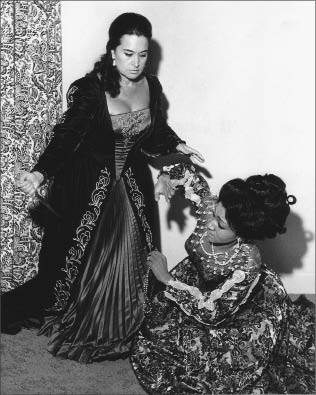The Curse of the
Joyous Woman, Part I

When it comes to my own brushes with operatic madness, Amilcare Ponchielli’s La Gioconda is unusually well represented. My curse with this rarely-performed work began in San Francisco in 1967, when I directed a production starring the Turkish soprano Leyla Gencer and the African-American mezzo-soprano Grace Bumbry. What I was not aware of was that these singers had had a bad experience together at La Scala. In other words, they hated each other. They even refused to speak directly to each other, channeling all communication through me. In rehearsal, even if they were holding hands, Grace would turn to me and say, “Lotfi, is she going to do it this badly on the night of the performance?” Or Leyla would ask, “Lotfi, is she ever going to learn her role?” or “Is she going to cross in front of me right in the middle of my high note?”

Leyla Gencer and Grace Bumbry in La Gioconda, 1967.
Photo by Carolyn Mason Jones.
One evening I was called into Leyla’s dressing room. “Maestro Mansouri,” she intoned in a syrupy voice, “please talk to La Grace. She is a ve-e-rr-y nice girl. She has got a big talent so she doesn’t need to put her hands in front of me when I am singing. And she doesn’t need to step on my feet. She’s ve-e-rr-y nice, you understand, but tell her it is unnecessary to do these things. You must tell La Grace these things, maestro. I cannot because, you see, in Turkey we were taught never to talk to the black servants.” Needless to say, I never told Grace about this little conversation.
I had previously worked with Gencer on a production of Simon Boccanegra. And I had known Grace for ages. Back when we were students of Lotte Lehmann at the Music Academy of the West, I had even done scene work with her, singing Manrico to her Azucena in excerpts from Il Trovatore. Back then she was brash and down-to-earth. But now, as a world-renowned artist, she had adopted the trappings of the archetypical diva. In fact, she had become a grande dame. She had taken to driving around in a white Mercedes, and she had acquired a trophy husband, a tenor from somewhere in Eastern Europe. I remembered this gentleman from a production of Otello in Basel, Switzerland, where his talents had enabled him to attain the position of third cover of the role of Cassio. Fortunately for him, his exceptional looks made up for his lack of singing ability. One day, during a rehearsal, she turned suddenly and said, “Look at that bastard!” Her husband was sound asleep in the auditorium. I asked Grace why she married him and she replied, “Honey, he looks great carrying my luggage.”
Mezzo-soprano Maureen Forrester, who played La Cieca, provided a much-needed dose of normal behavior, and the fireworks between Leyla and Grace fascinated her. One day I saw her sitting in on one of the rehearsals even though she was not called. When I told her to go home and enjoy the rest of her day, she answered, “Are you kidding? Just watching this is a good time. I wouldn’t miss it for all the world.”
The curtain calls received as much attention as the performance — maybe more. Everybody from the administrative offices, including General Director Kurt Herbert Adler, would race down to see them. La Grace would sweep out — to hell with Gencer — and take a grand bow. She was a superb, statuesque lady with a wonderful physical presence — her legs got to centre stage a full minute before the rest of her. Then dumpy little Leyla would stomp out for her curtain call, only to have Grace sweep in front of her. Finally, just as she was exiting, Gencer would subtly step on Grace’s train. Every night there was a variation on this sort of thing. It was the best show in town and nobody wanted to miss a moment of it.
On opening night, following the eventful curtain call, Mr. Adler asked me to call the cast back to the stage to greet California’s then-governor, Ronald Reagan, and his wife, Nancy Davis. Grace refused. It had nothing to do with politics, she simply didn’t want to. She had given a fine performance, the audience had showered her with applause and flowers, and as far as she was concerned, her night was over — no matter who was in the house. I knew her well enough to coax her to the stage. The Reagans went down the line, shaking hands and having a few words with each artist. When they got to Grace, her eyes blazed through them and her smile barely concealed her displeasure at what was to her an imposition. I was standing at the end of the line, and the instant the Reagans passed her, Grace looked down the line and yelled, “Can I go now, Lotfi?” The Reagans graciously pretended not to notice as I melted in embarrassment.